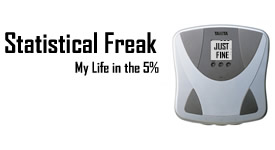Epic Head-Desk Ahead!
Generally I’m big fan of MSNBC, especially Rachel Maddow, so I pop over to their site almost every day to scan the headlines and catch her show. A couple of evenings ago I saw a headline: “The Surprising New Face of Obesity.” Is it EVER surprising! Surprising how a couple of researchers, some data and a headline can be SO CLOSE and yet SO FAR on an issue so close to my heart.
It’s a lot of fail and fear-mongering wrapped up into one bit of “journalism,” so it’s hard to know where to start, but I suppose the beginning is best. The opening salvo is that the obesity epi-panic is MUCH WORSE than anyone realized, and it’s all the BMI’s fault. That researchers and mainstream media have finally caught on that BMI is a poor indicator of health is a good thing, but then they go on to talk about how fat is what causes heart disease, depression, menstrual problems, cancer, anxiety and other illnesses. REALLY?! No. Correlation does not equal causation. Being fat in a culture that hates fat people will definitely cause anxiety, and yo-yo dieting, or weight cycling, can definitely cause depression because, hey, who likes a 95% chance of failure? The menstrual problems mentioned are probably polycystic ovarian sydrome, which isn’t CAUSED by fat, but CAUSES someone to appear fat/creates fat. Gebus. I’m no medical school professor, but even a quick wander through Google or Wikipedia will tell you these things. It’s not like folks in the Fatosphere and elsewhere haven’t been writing for a decade or so about the emotional, mental and physical damage caused by being despised, and PCOS isn’t exactly a new thing. Being fat may cause heart disease, but then again there’s a strong genetic factor. Same with diabetes. Being fat can also protect you during cardiac events or after surgery. The obesity paradox rears it’s beautiful chubby face again!
Anyway, their solution to the whole “fat is the number one predictor of who’s going to live or die” thing is to simply change the definition (again!) of who’s overweight, obese, etc. Seriously.
Based on these findings, Braverman and his co-author Dr. Nirav Shah, the current New York state health commissioner, suggest lowering the BMI definition of obesity from 30 to 24 in women and down to 28 in males. Under these suggested guidelines, a woman who is 5’ 6” and 150 pounds would be considered obese. Under the current BMI standards, the same woman would be considered healthy.
Everyone dies, Dr. Braverman. Whether or not they’re costing America a lot of money or not is beside the point. Instead of focusing on how healthy people are, which this was a perfect opportunity to do, these researchers chose to suggest moving the goalposts so MORE people suddenly become overweight and obese. That worked out so well in 1998! I’m sure that won’t increase stigma against fat folks at all! I’m sure it won’t funnel more money into the $60 billion a year diet and weight loss industries either! *EPIC HEAD-DESK*
This really was the perfect opportunity for Dr. Braverman and Dr. Shah to make a dramatic U-turn and say, “Hey, instead of focusing on fat and weight as a predictor of health (because let’s face it, those are pretty bad predictors), let’s work on this cool idea we heard about called Health at Every Size. Instead of stigmatizing certain numbers as good or bad, we focus on overall behaviours and attitudes towards food and health. Yeah! Great idea!” Sadly, they did the opposite and drove to the next battlefield in the War on Fat People Obesity. Depending on how far reaching and influential their findings are, the rest of us might just get dragged along with them.

Trackbacks
- And then they’ll come for you… | I AM in shape. ROUND is a shape.






















Yeah, CNN had an item about this too. I really think it all comes down to the fact that obesity rates have been level ever since 2001 (right after they lowered the BMI in 1998 and made millions of people overweight/obese overnight without them gaining an ounce). If obesity rates are level and not rising, there can’t be an epidemic, can’t be any reason to inflame/terrify people about becoming fat, so of course they have to lower the standard at which they diagnose people as obese - and you notice, women get to be diagnosed obese a full 4 BMI points below men. As if women aren’t plagued enough already with eating disorders, don’t yo-yo diet enough already, don’t hate themselves enough already. Now instead of being “overweight” at a BMI of 25, a woman is going to be “obese” at a BMI of 24. How fucking ridiculous is that? This is not about health, this is about selling more diets to more women for more years (as if there aren’t enough women worried about their weight already). If they were really worried about all those “normal” people who supposedly have that internal fat that’s killing them, why the hell aren’t they telling them that healthy eating and exercise in moderation will help improve their health and that being sedentary/eating a lousy diet is what’s wreaking havoc with their health? Because it’s not about health - it’s about money, the money that’s made when you scare the hell out of people over their health and tell them they need to buy this diet/use these drugs/buy this gym membership/buy this exercise equipment/spend, spend, spend.
If these new BMI criteria came in, I’d wager any amount you like that there’d be an even bigger epidemic of disordered eating than there is now.
The current cut-off for ‘obese’ is 30, and the cut-off for ‘overweight’ (i.e. the upper limit of the supposed ‘healthy’ weight range) is five points below that at 25. It’s logical to assume that if they lower ‘obese’ to 24, then ‘overweight’ will start at 19. I once, briefly and unintentionally, in my early 20s, hit a BMI of 20, and I felt absolutely lousy and exhausted - yet that would be a point into ‘overweight’ by these new standards. For those who struggle already to get (temporarily) below 25 (and now, over twenty years on, that would include me, if I were still interested in struggling), this just makes it more likely that they’ll undertake extreme and dangerous behaviours to get below 19.
You’re absolutely right, Vesta - this has nothing whatever to do with health - in fact, the exact opposite. My one hope, if this did come in, is that all the people who regard themselves as being at a ‘normal’ weight, but suddenly find themselves ‘too heavy’, might turn round and realize what a heap of you-know-what the whole thing is. (But then, I would have hoped that might have happened in 1998 - I suspect most people didn’t even realize the criteria had changed at the time. At least now, there might be slightly more realization that the goalposts are being moved.)
Wow. Even at my lowest post-puberty weight, I’d be obese. In all my years of dieting, that was the goal weight that I moved further and further away from with each weight cycle. I wasn’t even fat back then, at least not by the standards of the time. I guess I’ll be upgraded to deathfat at my current weight. I can’t wait for the concern trolling to increase! Dare to dream the standards might be raised to support the findings of Bacon, et. al., eh? I know, I know, no profit/fun in not scaring people skinny.
I facepalmed when I saw this article blasted all over the internet yesterday. It’s a totally ludicrous idea. I can’t believe my tax dollars are being wasted for Mr. Shah to waste his time doing this sort of thing.
This is my favorite line:
“The fat is what causes heart disease, cancer, menstrual problems, depression, anxiety, and a host of medical problems,” said Dr. Eric Braverman”
Dr. Braverman, if you and Shah can prove that having the levels of fat consistent with an individual having a BMI of 25, cause any of these things, I’ll eat my fucking shoe. But I guess he’s an expert, because he’s an MD and a professor in *neurosurgery*.
I had to hunt for the name of the study, but here it is, and it’s free:
http://www.plosone.org/article/info%3Adoi%2F10.1371%2Fjournal.pone.0033308
Thank you! I couldn’t find the actual study anywhere.
I can’t wait to read the report that Kala posted (thanks Kala!), but the major logic fail in this is that BMI doesn’t work because it does not distinguish between fat and muscle, and that it is a person’s individual body fat percentage, not their BMI, that they propose as the best measure of health.
From the article: “BMI doesn’t tell you how much fat … you have,” said Braverman. “So without knowing how much fat you have, you can’t really save people from illness. It is the number one predictor of who’s going to live or die.”
The way they measured body fat was with a DXA scan, so Braverman recommends making them, and leptin panels, a part of regular checkups: “A dollar blood test and doing our bone density scans with body fat scans at the same time is going to save us an enormous medical cost in the end.”
But if we’re going to have the DXA scans, then WHY LOWER THE BMI THRESHOLD? It doesn’t make sense. Shouldn’t the primary recommendation be to incorporate DXA scans and leptin bloodwork into practices? But from this article, it seems that the primary recommendation is to not only continue using BMI as a metric, but to expand it to include more people.
And notice that they lower it more for women than men, when most research shows that women should have a higher BMI threshold than men, with some suggesting as much as a 5 point gap for women.
This is what is really galling… the WHO and CDC decided to use one number (30) as the definition of obesity for both genders, even though research suggests men show greater negative correlations at lower weights. Now, these researchers are going in the exact OPPOSITE direction and saying that women should have lower thresholds than men. I’ll be curious to see what their justification for this is.
If this proposal gains any traction at all, this will be the next big battle for Fat Acceptance. We cannot allow government agencies to continue moving the goalposts in an attempt to whip up more panic. This is ridiculous and it will not stand.
Peace,
Shannon
Well they suppose lowering the BMI rate because of misclassification. The rate of misclassification runs about 39%. Now, this doesn’t make a whole lot of sense to me, because what about the 60% of people who are not misclassified. How does lowering the BMI obesity threshold do anything for those individuals?
Also, I’d like to note that all of their data, comes from a “multi-speciality private pracitce” clinic in NYC with a DXA scanner, and the DXA scans were originally taken to measure bone density (the main use of such scans at this point in time). The mean of this data was 51.4, with a not-huge standard deviation, showing you that the bulk of those measured were in their middle ages. They also directly state in the paper that they didn’t have enough of a racial background to create a representative population. I’d also personally wonder how isolating people who previous had DXA scans would alter the results. I highly doubt you’d see such a high level of misclassification from individuals who were not already being stuck in a machine to evaluate their bone density. If this effect was controlled for, I don’t know how yet, nor do I have any suspicion of how accurate this might be.
I haven’t read the whole thing in full, but those are my thoughts from my initial skim of it.
Being an engineer and having studied some pattern recognition/machine learning, leads me to this thought: When you have a feature of data, in this case BMI, and you have several classes that you would like to sort those data points into, like the underweight, normal, overweight, and obese categories (purportedly based on body fat percentage here), you have a few choices. If your data is being misclassified at a high rate, you can attempt at first to see if there exists some sort of minimum error thresholding that leads to an acceptable error rate (i.e., change the BMI thresholds). This might work, this might not, in this case I do not believe that this would work.
But oftentimes, what a high rate of misclassification really means (and I would certainly call a 40% misclassificatoin rate a high rate), is that you do not have sufficient information to make the classification, period. The solution to this problem is including another feature, another variable (maybe some measurement from a DXA scan or maybe a caliper test), and then making your classification based on more than one variable. However, not just any variable will necessarily work here.
Now, how the clinicians who ran this study then go on to publicly conflate correlation with causation, that’s another problem altogether. But this at its core this paper is more of a matter of, can we sort people into categories regarding their body fat percentage, given the BMI measurement, or other, measurements. I’m considering the bulk of the rest of their statements to be more along the lines of conjecture.
The tl;dr is that I don’t think it makes a whole lot of sense to attempt to take a multidimensional phenomena, and then project it down to the single dimension of BMI by changing the category thresholds.
If they lower the ‘healthy’ BMI of women that much is will become a war on boobs >..<
What a strange new twist this is. For years the FA/body acceptance movement has been declaring BMI to be an inaccurate predictor of health, and using BMI has classified some perfectly healthy people as “unhealthy” based on their BMI.
NEW THREAT: BMI may not classify enough people as “unhealthy,” ie - you could look perfectly “normal” and not realize that you are fat! Fatty. Hey - skinny person, new rules: you’re fat! Want us to prove it? We’ll test you for fat! Sure, we could test you for actual medical conditions and diseases instead…. but we wanna test you for FAT instead, then we can simply assume that you probably have some type of illness and will eventually die.
lol this is the tl:dr version of my post. Well done!
Maybe moving the “obese” goalpost down to 24 is the best thing that could happen! It would be like the Republicans suddenly going after our birth control pills after years of chipping away at abortion rights. There might be national outrage! It would wake a whole lot of people up to how freakin’ arbitrary and ridiculous all of these numbers already are. People of all sizes could post their pictures on the internet with captions saying “this is what OBESE looks like”. The BMI charts and the obesi-panic would become the subject of permanent ridicule.
Hey one can dream, right?
I just realised that there is a good chance my b/f’s sister would end up in the overweight to obese category if they change the definitions, the woman has a strong, compact build, does high ropes access work for a living and Thai boxing for a hobby, she is fit and strong, but does not have a skinny build.
It’s bad enough that doctors are too lazy to do their job properly for the larger people in the population, they now want to extend that to those who have ‘normal’ sized bodies.
If they continue on this way then Calista Flockhart’s will become the ideal body type >.<